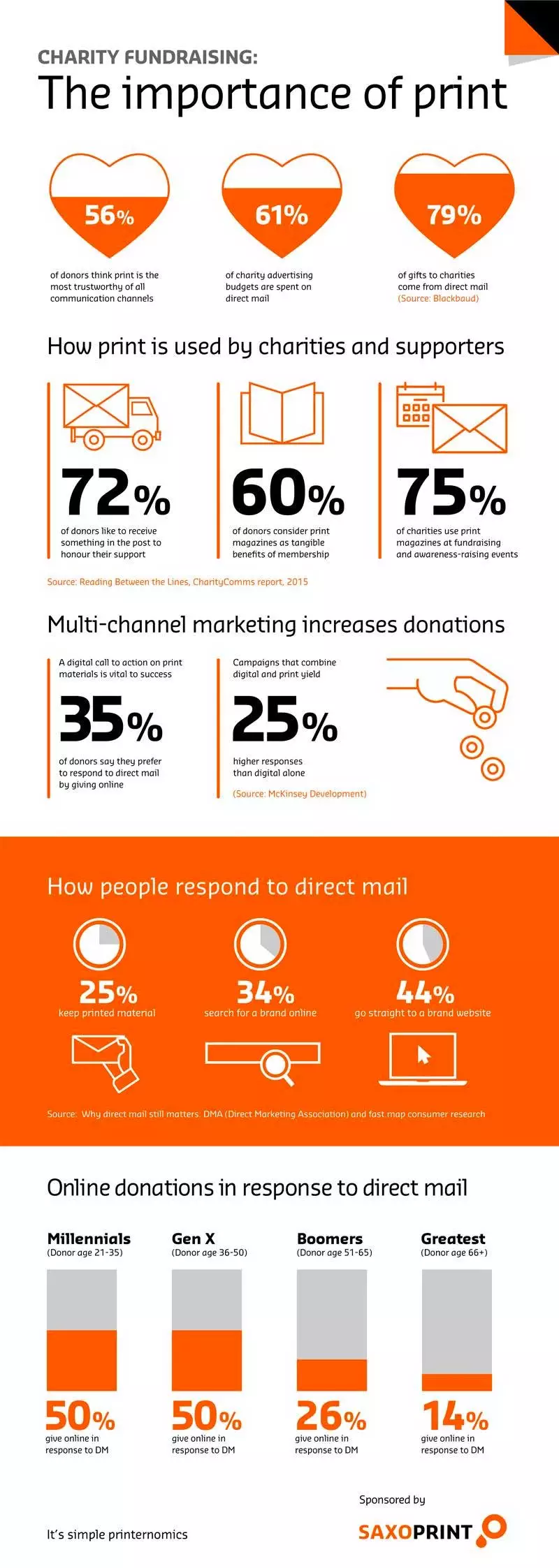Charity fundraising and print: the importance of direct mail [INFOGRAPHIC]
Budgets are in question, methods of contacting donors under moral and legislative reform, and it’s your job to use your supporters’ donations most efficiently and effectively. With the growing plethora of marketing and communication channels available, how can you be sure your fundraising efforts are best placed? Let’s get straight to the facts.
79% of donations for charities come from direct mail. Yes, you read that right. According to “The Good Fundraising Guide” by the Institute of Fundraising, the ROI of fundraising via print is staggering: for every £1 spent, £4 in donations are received. With 45% of the UK voluntary sector’s total income (£11.8 billion) coming from donations, it’s important that charity fundraising efforts continue to rely on the most trusted form of communication: print.
While postage costs remain an issue, the fundamental need for print remains unchanged. There’s no better way for charities to create a strong, appealing message, to showcase the stories of how your charity uses its donations, to appeal for donations, and to encourage ongoing engagement with your cause.
Advertisement
Charity Fundraising: The Importance of Direct Mail INFOGRAPHIC

How print and direct mail is used by charities and supporters
56% of donors see print as the most ‘trustworthy’ channel and it remains the preferred route of contact amongst the majority of high donor and young donor demographics, alongside women.
(Source: Institute of Fundraising: Fundraising Media DNA 2015) Retained for longer due to its physical nature (known as the ‘mantel-piece effect’), print inspires loyalty, action and retention. 25% of printed material is kept for future reference. It’s why charities continue to spend 61% of their fundraising budgets on direct mail:
• 72% of charities produce magazines for supporters
• 28% send their magazines three times a year
• 27% send their magazines quarterly
The ‘sweet spot’ of print
Potential donors and your existing supporters are human beings. They like to read about your charity’s activities, to hold your well-crafted message in their hands. “Charities are aware that supporters want to feel connected to the cause they support, and nothing does that more tangibly, involving all the senses, like a beautifully printed item,” says Phil Foster, UK Key Account Manager at SAXOPRINT.
Staying in the forefront of your donors’ minds isn’t just about fundraising appeals: a single, well-timed ‘thank you’ can impact donor loyalty significantly. “The increase in seasonally printed items such as Christmas cards and calendars in recent years has been phenomenal,” says Phil.
But most importantly: increasing donations is about providing the quickest, most efficient route for donors to give. According to the Institute of Fundraising: “Fundraising appeals work best when there is a letter, a response form and a reply envelope. These three elements are essential to increased donations.”
Print to digital: combining channels for maximum effect
Campaigns combining digital and print yield 25% higher responses than digital alone. (Source: McKinsey Development) So, while print is certainly the power-house of your communication, it’s vital to harness the immediacy of digital to allow supporters to give in the ways that are most convenient. Linking your printed message to your digital donations platform is imperative.
Do your fundraising appeals ensure frictionless giving? According to MobileCause’s 2015 report “The Direct Mail Paradox and How you are Losing Donations”:
• Over 30% of the British public have made a donation via mobile
• 84% of donation pages aren’t mobile friendly
• 65% of non-profits’ sites require 3 or more clicks to make a gift
Tying in your message across multiple platforms is the key to a cohesive fundraising effort. So, while print drives the message, charities must adapt this message for multiple channels – namely social media – which provides the perfect space to share videos, interviews, and short articles that don’t fit the bill for your official communication channels. See for yourself:
• Social media: the number of followers non-profits have on Twitter grew by 264% in 2012
• Non-profits share a daily average of 1.2 updates on Facebook and 5.3 Tweets
It’s simple ‘printernomics’: print + digital = increased donations
Multi-channel marketing is important on so many levels. Mostly, you provide access to your cause in the way your supporters prefer. Can your fundraising efforts afford to ignore the power of print? Are you harnessing the power of print to move your donors to action online?
SAXOPRINT offers exceptional print quality. The company has one of the most modern technology parks in the global printing industry at its disposal. The online printing company has invested almost €20 million in new equipment, production processes and new employees over the last two years. Thanks to efficient work processes in prepress, production, processing and dispatch, as well as the very latest technologies, the company is able to carry out thousands of print orders every day on schedule.
Sustainability and climate protection are also important factors for SAXOPRINT. Using the very latest printing technologies, over 350,000 customers throughout Europe count on SAXOPRINT for their environmentally friendly printing needs. Based on the collaboration with ClimatePartner, a leading provider of climate protection solutions, customers can make their own individual contribution to climate protection and optimise their CO₂ footprint.



